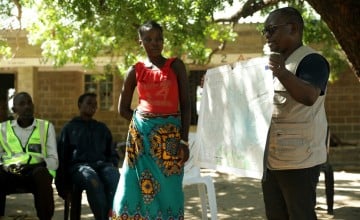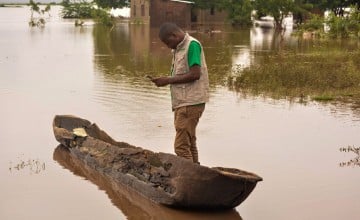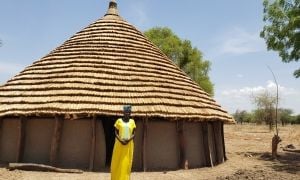
Read our 2024 annual report

Knowledge Hub
Leveraging WhatsApp to increase disaster preparedness in Malawi
In Malawi’s Nsanje District, where flooding is a recurring threat during rainy seasons, communities have long grappled with the devastating impacts of extreme weather. In 2022, Cyclones Anna and Gombe brought considerable destruction, displacement, and loss of life across communities in Nsanje, and served as a brutal reminder of the urgent need for faster, more reliable communication in preparation and response to crises. In response, Concern Malawi, launching the Zurich Climate Resilience Alliance (ZCRA) programme, leveraging one of the most widely used communication tools globally: WhatsApp.
This initiative aimed to increase disaster preparedness and response through the timely sharing of early warning messages and weather forecasts via the creation of a WhatsApp group. Concern Malawi was already using SMS messaging, awareness meetings and campaigns using public address systems and local radio stations. Utilising WhatsApp as a platform for communicating early warning messages would also provide multiple benefits: costs effectiveness, ease of creating groups with appropriate recipients, ability to control content of the messages.

Building a Community of Preparedness
At the centre of the initiative was a simple idea: using WhatsApp to create a communication network for the Disaster Management Committees (DMCs) in project scope areas. In total, this was 22 WhatsApp groups; 7 at Area level and 15 at Community level.
The groups are now a vital information hub for Nsanje communities. Through the DMC, members disseminate updates on disaster preparedness and management, including insights on relief efforts, shelter locations, and food distribution during lean season. In addition, members receive tailored messages on topics including flood preparedness, health promotion, climate-smart agriculture, and evacuation protocols.
For those that don’t have smart phones, SMS is used. In addition, the early warning messages are also communicated by other means for those that don’t have phones, for example awareness-raising community meetings and campaigns using public address systems and local radio stations.

Learning and Improving
There have been significant advantages to using Whatsapp as a communication platform for early warning systems;
- Cost effectiveness: Setting up groups and sharing messages is very low cost.
- Accessibility: Concern set up the groups using existing disaster management structure and it provided a opportunity to systematically map who needs to be reached and identify those who were difficult to reach with warning messages previously.
- Prevents misinformation: To prevent the spread of misinformation Concern staff manage the WhatsApp groups as ‘admins’, only allowing verified messages to be shared and also allowing members to ask questions based on the shared information.
- Combination of approaches: Concern combines the Whatsapp messages with other communication methods such as community meetings, local radio, announcements through PA systems, loudspeakers etc. This combination is essential to reach as many people as possible, especially those hardest to reach populations and is also important for reinforcing and further explaining the content of the Whatsapp and SMS messages.
After the creation of the group, a short survey was shared across DMC members to assess its effectiveness. Participants provided feedback on:
- The frequency and timeliness of early warning messages.
- Community responses to shared information.
- Opportunities and limitations of using WhatsApp for disaster communication.
This feedback allowed for continuous improvement, refining how and when messages were shared and strengthening the group’s role as a trusted information source.

Real Impact: Cyclone Freddy
When Cyclone Freddy struck in February 2023, the value of the WhatsApp group became clear. The timely dissemination of early warning messages days before of flooding or cyclone events (72-24 hours), right ahead of them (24-12 hours) as well as across their duration, meant that DMC members could quickly inform their communities, empowering them to prepare and evacuate promptly. In turn, this helped to reduce fatalities and injuries in this and subsequent cyclones, protecting infrastructure and private property.
“The group shares very valuable information, increasing awareness and preparation for cyclones and disasters."
"It reduced damage to property and assets because communities could protect themselves before it happened. Without warning messages, members of our communities may not have evacuated in time and could have perished.”
Looking Ahead
What started as a grassroots digital intervention in Nsanje has proven to be a scalable, community-driven solution to one of the most pressing challenges of our time. This initiative highlights how simple digital tools can deliver impact, particularly in areas with limited access to formal communication channels. While Concern’s project staff collected WhatsApp numbers for local leaders and DMC committee members from 15 communities, this initiative has expended to other communities outside Concern’s ZCRA impact areas within the district. Our teams have already seen NGO’s, such as CARD, replicating the model across their operations in T/A Ndamera.
As climate-related disasters become more frequent, there is a compelling case for scaling up this approach. Expanding the WhatsApp model to other districts across Malawi and integrating it with national early warning systems and the Department of Climate Change and Meteorological Services could significantly enhance the country’s disaster preparedness and resilience.




